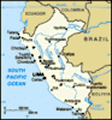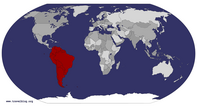Advertisement
Published: October 2nd 2005
I´ve seen some fine examples of local wildlife here in zoos, like monkeys, parrots, anacondas, pumas, and jaguars...but not much in the wild, save for dolphins, birds, and large spiders. The bugs bite pretty ferociously, so I always wear repellent with 100% DEET. The mosquitos carrying malaria only bite at night, so this is the most important time to be protected. The jungle is an ant´s paradise, and there are ants ranging in size from half a centimeter to one flying female I saw which was about two inches! They live everywhere, underground, and often have huge nests in the trees. Lastly, if you´re wondering what passes for roadkill (and I know you are), once I saw a creature on the side of the road, similar to a large monkey, but more like a cross between a sloth and a koala bear. I think they´re nocturnal.
As for Sebastian´s projects and research, they were less apparent than I had expected. In this area, most of the effort was focused on educating people about pollution and waste-management. He had put up lots of signs warning about the health effects of littering and poor human and animal waste disposal. He had helped

 Shipibo Girls on Their Way to School
Shipibo Girls on Their Way to School
They learn two languages at elementary school - Spanish and Shipibo. Good Morning is "Hacunya Macari."build huts for several people who had nowhere to live, and had brought in volunteers to clean up the vast amounts of trash that is already there. But this message, and these efforts seem to be sinking in very slowly with this indigenous group, called Shipibo-Conibo. Sebastian was, in the end, very frustrated that people were still throwing trash anywhere and everywhere. But it´s not just Pucallpa or San Francisco, it´s the same in Lima and everywhere in between. For example, there is a famous bottled water factory two hours outside of Lima on the River Rimac. There are signs everywhere advertising their brand of water, supposedly the cleanest and freshest in all of Peru. But both up- and downstream, the river is littered with tonnes and tonnes of trash, in a place that would otherwise remind one of Tumwater Canyon. It is endlessly frustrating and mindboggling why anyone would let this continue, much less participate in it. It appears that it´s going to take many more years and many more people to get this problem under control.
In San Francisco there was one other person working on the problem of waste management. His name is Brian and he

 Cleaning up the Restaurant
Cleaning up the Restaurant
Early in the morning people go out to clean up their store fronts and businesses. This woman had a restaurant by Lake Yarinacocha. The dolphins were visible for hours this morning.comes from Nebraska. We just called him "El Famoso" because absolutely everyone in town knew of him. Whenever they heard I was from the US, they would say "Oh you should meet Brian." He was digging holes everywhere for people to put their organic waste to convert into compost, and had built a "trash house" where he and some locals were separating trash to be recycled. It was right next to the school, so all the kids could see what was happening. There are other projects as well...the effort continues.
Brian told me a funny story about when he first arrived in San Francisco. There is a legend that years ago, white people came to the village and killed many locals, extracting "oil" from their skin to power their machines. They would come at night, and always carried bright, blinding lights. The white people became known as Pishtacos. When Brian first arrived, many were afraid of him, calling him Pishtaco too. But after a few weeks, when they saw he meant them no harm, they warmed up to him. Then Brian left town for a few weeks without telling anyone. A local man bragged that he had killed Brian,

 My Horse, Hurricane
My Horse, Hurricane
Willi´s son Pablo with Hurricane. Those are the "Peruvian" cockfighters in the background. They cost $1,000 apiece supposedly.the Pishtaco, but the villagers were upset. Several got together and shot the man, leaving his body in the jungle. Soon enough, Brian returned to San Francisco, and everyone realized the terrible mistake that had been made. Nothing more happned, but the story speaks to the umfamiliarity the community feels towards white people. Soon, in jest some of the young girls would call me Pishtaca. People were overall very curious about me, they wanted to know how far I live from New Orleans and how many hours away by car I was from Washington, D.C. Although their geographical knowledge was limited and most spoke no English at all, all were extremely welcoming and kind towards me.
One day a middle aged woman in town died after being sick for quite some time. There was an announcement made over the loudspeaker so everyone in town would know; she was related to almost everyone. They put the body in a coffin and placed it in a public spot, so all could pay their respects. All of the women and girls wailed at the top of their lungs. There were tears, but I felt almost as if they were not really crying,

 The Other Willi
The Other Willi
Here is Sebastian with our favorite little boy, Willi. He never cries, just plays with his older sister Cinthia who loves to speak some words of English with me.but that they are greiving out of obligation. Or rather, that it is only custom to wail when someone dies, and that even though they might be sad, the tears are forced. So the women moped around town all day wailing, the men looked somber, and the children continuously ran to the funeral site. Into the night the same women were still wailing, only now there were purple lights surrounding the coffin. The next morning, the body was gone and the women were back to their normal cheerful selves.
On Friday, September 16th, we left for Cochibococha, a small lake where Sebastian´s friend owned a ranch. We traveled 30 minutes by taxi, then loaded onto two tiny boats, made of carved tree trunks. Someone paddled, while the others simply observed the calm, misty jungle surrounding the lake at 6:00 a.m. Sebastian´s friend Willi is one of the wealthiest people I´ve personally met in Peru. He owns a large compound with several huts, has many animals, such as horses, cattle, pigs, and chickens, and a spider monkey named Morena. He has two ranch-hands, and has also taken in two young brothers who have been abandoned by their parents. The boys probably help just as much as the two ranch-hands do; they always seem to be working. On the second day here, after a breakfast of a whole fish (minus the eyes) each, we went horseback riding. I don´t know how to ride, but they gave me some basic instructions and sent me on my way. I was a bit scared, given that the horse´s name was Hurricane, and that a horse was recently killed on the property by a wild jaguar. If we got chased by a jaguar, I´m sure I´d learn to ride real quick! Fortunately, I didn´t see any ferocious wildlife, but I did learn to ride in no time. After two hours, and an unsuccessful attempt to get the horses to cross a small stream, we headed back.
That night, the cook was extremely drunk. He kept shouting at the cockfighting chickens, "We are Peruvians!" Antoni, the eight year old orphan who lived there, was afraid and so he spent the night talking with us. He was from the mountains and was full of stories about the cartel and the opposing military. When he was younger and still lived at home, he would help his father sort and dry coca leaves. But, he said, they would not make it into cocaine; they would only dry the leaves to sell to those who would make the drug. He said that many people had guns, and that people were often killed by the cartel. Sebastian and I were amazed and impressed by what this little boy had already experienced in his life. But there was more: Sometimes the military would swoop down in helicopters. They would all jump out with their guns and tell everyone to stay put. But all the drug makers and dealers would scatter. We made Antoni repeat this story about three times, just to be sure we had heard correctly. I would say, "Antoni, is all of that true?" He would reply simply, "Si, Tia. (Yes, Auntie)." The cook continued his drunken rampage the whole night, so Antoni slept with me in my hammock. The first thing I heard in the morning was "Buenos Dias, Tia!" and Antoni runs off at 5:00 a.m. to work again. When we had to go, I felt so sad to leave Antoni behind; I had racked my brain wondering if it was at all feasible to bring him home with me. But in the end, though he is an orphan living practically alone on a farm an hour away from the nearest town, I thought it would be better for him to stay there. We said we would send him and his older brother some boxes of clothes and toys, and that was it.
I visited a sugar plantation up-lake an hour by boat. The owner was Willi´s brother, and he was happy to show us how the cane was crushed and filtered. They had recently installed new modern equipment; before they had used a remedial grinding device and simple, huge tubs. The cane fields spread out as far as you could see, and were fenced in only by the jungle.
Advertisement
Tot: 0.087s; Tpl: 0.011s; cc: 8; qc: 61; dbt: 0.0506s; 1; m:domysql w:travelblog (10.17.0.13); sld: 1;
; mem: 1.2mb









